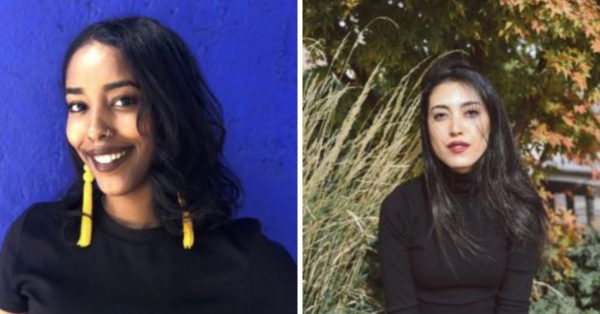
Somalia’s Jamila Osman and Egypt’s Nadra Mabrouk have been named joint winners of the 2019 Brunel International African Poetry Prize, from a shortlist of ten poets. Mabrouk is the first Egyptian to win the prize, and Osman is the third Somali. Their win is the fourth time, in its seven years of existence, that the prize has gone to more than one poet.
Founded in 2012 by the Nigerian-British poet and novelist Bernardine Evaristo, the £3,000 prize—co-sponsored by Brunel University, London; the African Poetry Book Fund; and Commonwealth Writers—is in its sixth year and is “aimed at the development, celebration and promotion of poetry from Africa.” It is open to African poets worldwide who have not yet published a full poetry collection. Each poet has to submit 10 poems in order to be eligible.
Here are the ten poets shortlisted for the 2019 prize. Click on their names to read Brittle Paper‘s reviews of their poems:
- Afua Ansong (Ghana)
- Mary-Alice Daniel (Nigeria)
- Inua Ellams (Nigeria)
- K. Eltinae (Nubian Sudan)
- Omotara James (Nigeria)
- Nadra Mabrouk (Egypt)
- Selina Nwulu (Nigeria)
- Emmanuel Oppong (Ghana)
- Jamila Osman (Somalia)
- Sherry Shenoda (Egypt)
The 2019 judges were the poets Leila Chatti, Phillippaa Yaa de Villers, and Matthew Shenoda, who chaired the panel. Here is their comment on the winners:
In the work of Nadra Mabrouk lines fold into lines and teach us the alchemy of presence and history. Hers is a poetry often seeking the subtle moments that thread our humanity together through a celebration of the lucid and quotidian. Mabrouk’s ability to make music in celebration of the pure joys of language is a restorative salve in contemporary poetry. Hers is a voice that will pull the reader into and outside of themselves.
In Jamila Osman’s poetry the reader is introduced to a poet whose cadence and craft come together like the fine edge of a knife. Osman’s detailed view of memory both personal and collective create a space for poems that are dipped in diasporic ink and carry a trajectory forever rooted in her home country of Somalia. Jamila Osman is a poet of allegorical beauty and someone for whom we should all be delighted to read more of in the future.
Commenting on the significance of the prize, Bernardine Evaristo observed: “When I started the prize in 2012, African poetry was almost invisible on the international literary landscape. Today there are legions of poets out there successfully building careers and being heard. This quiet revolution demonstrates the power of initiaves such as mine, the African Poetry Book Fund’s many spearheading prize and publishing projects, and other schemes, to revolutionise the literature of an entire continent. Today the future looks very bright and African poetry is a global force staking its claim and producing some of the most exciting writing to be found anywhere.”
_________________________________________________________________________
ABOUT THE WINNERS
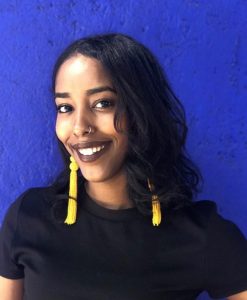
Jamila Osman is a Portland-based Somali writer and educator currently working on a memoir.
From Brittle Paper‘s review of Osman’s poems:
In a shrill voice, almost lurid in its discomforting realities, before tapering slowly towards silence, Osman interrogates the significance of sound as an emblem of power in a patriarchal world order.
In “Original Sin,” she lays out the hypocrisy in the religious fable of Adam and Hawa, our collective refusal to hold the man responsible for his own indiscretions, placing the blame on the woman for existing. The most resonant part of the poem, however, comes in the final stanzas.
Echoing American poet Muriel Rukesyer’s question—“What would happen if one woman would tell the truth about her life?”—Osman starts “Sovereign State” by promising to tell intimate truths about herself, to split open the silence she has been conditioned to nurture.
In “Folklore,” Osman acknowledges that there is a problem but does not seem to have an interest in ending it. She just learns to accept it and that voice, that reverberating voice we heard in the beginning dissolves into a distressing quiet.
Read the full review HERE.
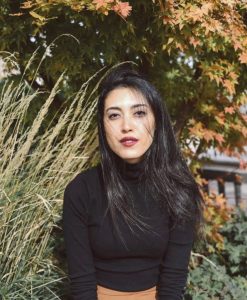
Nadra Mabrouk is a poet from Cairo, Egypt. She is the author of the chapbook How Things Tasted When We Were Young, published by Finishing Line Press in 2016. Her work has appeared/ is forthcoming in POETRY, RHINO, Tinderbox Poetry Journal, among others. Her work is also forthcoming in The BreakBeat Poets Vol. 3: Halal If You Hear Me (Haymarket Books, 2019). She has been recognized as a finalist for the 2017 Brett Elizabeth Jenkins Poetry Prize. Currently, she is a content intern for The Academy of American Poets, and is an MFA candidate at New York University, where she is a Goldwater fellow.
From Brittle Paper‘s review of Nadra Mabrouk’s poetry:
Mabrouk’s brilliance is a self-announcing thing, with luminescent lines bursting with life and colour. In “Imagined Return,” she gives us a strange vision of someone who has reappeared after a supposed leaving. This sets the stage for a lavish display of mastery—mastery of imagery, of language, of emotion.
“Let’s Go Get Sammak” starts quickly with the action—excellent description distracting from the truth at hand. The momentary distraction soon bursts at its seams, as the third paragraph admits, “This won’t save us.” The work is a kind of drowning, a detachment from land, from home. It is a subject which has been explored many times over. Many, many times. Even on this shortlist, detachment is not a rarity. Mabrouk does not fall into redundancy, though. It is handled differently, with uniqueness.
In “Autumn,” Mabrouk says “the spine is a string of pearls.” This careful arrangement of visual metaphors is what has become the poet’s biggest strength. And she makes sure to flaunt it as much as possible.
Read the full review HERE.
_________________________________________________________________________
The Brunel International African Poetry Prize was won by Somalia’s Warsan Shire in 2013; Ethiopia’s Liyou Libsekal in 2014; Sudan’s Safia Elhillo and Uganda’s Nick Makoha in 2015; Nigeria’s Gbenga Adesina and Chekwube O. Danladi in 2016; Nigeria’s Romeo Oriogun in 2017; and Somalia’s Momtaza Mehri, Ethiopia’s Hiwot Adilow, and Nigeria’s Theresa Lola in 2018.
For interviews of the 2019 shortlisted poets, please contact: Bernardine.Evaristo@brunel.ac.uk.
Brittle Paper congratulates Jamila Osman and Nadra Mabrouk.
READ: Brunel Prize 2019 Poems Review | Part 1: Jamila Osman & Selina Nwulu
READ: Brunel Prize 2019 Poems Review | Part 2: Omotara James & K. Eltinae
READ: Brunel Prize 2019 Poems Review | Part 3: Afua Ansong & Mary-Alice Daniel
READ: Brunel Prize 2019 Poems Review | Part 4: Emmanuel Oppong & Sherry Shenoda
READ: Brunel Prize 2019 Poems Review | Part 5: Inua Ellams & Nadra Mabrouk


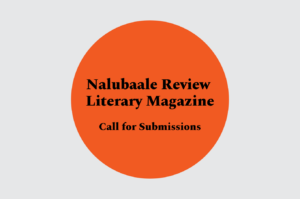

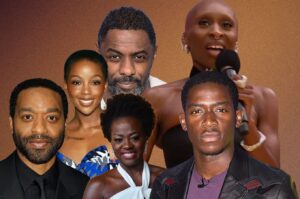


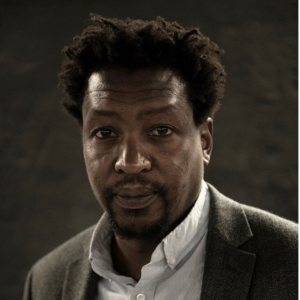

COMMENTS -
Reader Interactions